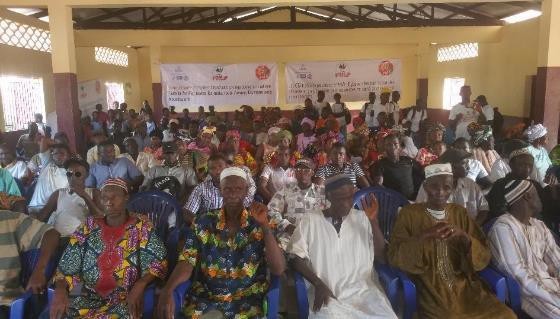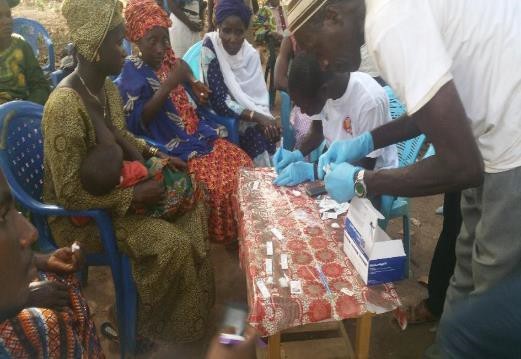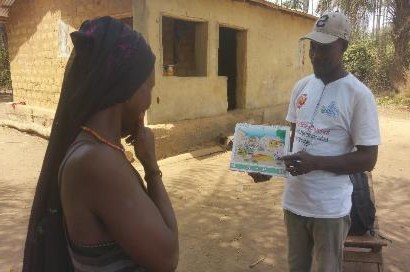In Guinea, malaria is the leading cause of healthcare visits (33.8%), hospitalizations (31%), and preventable deaths (14.2%). The entire population—particularly children under five years of age and pregnant women—is at risk. To achieve universal coverage that is consistent with World Health Organization recommendations, Guinea’s Ministry of Health adopted a malaria community case management strategy.
Guinea issues a Monthly Bulletin that lists the 10 health centers that have the highest incidence of malaria. For those health centers whose names appear in the Bulletin, the PMI-supported Program StopPalu, in collaboration with the district management teams, organizes activities to help community members understand the reasons for this high incidence and which actions to take to reverse the situation. One approach that has shown positive results is the organization of community dialogue meetings. Community dialogues bring together key members of a locality to discuss the issues that concern them and devise solutions to the problems raised. The community dialogue meetings are also a general platform for information sharing and exchanges, facilitated by individuals from the community.
The community dialogue activities have helped reduce the incidence of malaria in the district of Douprou, in Boffa Prefecture. Douprou was among the districts in Guinea with the highest incidence of malaria in 2016. To understand the reasons for the high incidence, StopPalu, in collaboration with the Prefectural Health Directorate in Boffa, organized a series of community dialogues in the communities that use the Douprou health center.
The community dialogues (and the activities leading up to them) brought together local authorities, religious leaders, heads of health centers, members of health and hygiene committees, community health workers, women’s groups, youth groups, and village members. The dialogues helped people understand the causes of their community’s high incidence of malaria, such as improper use of LLINs, lack of prompt care-seeking, stagnant water, and itinerant populations.
Other topics of discussion explored the links between the fishermen, who spend most of the night outside, and the high rate of malaria in this segment of the population. Some people stated that their homes are not well adapted to the use of LLINs (it is difficult to find places to hang LLINs), or that because they are busy, they seek care only when self-medication attempts fail. There are also many travelers from neighboring countries in this area who come for fishing, agriculture, and commerce. Because their countries do not offer malaria prevention or treatment at no cost (as is done in Guinea), these travelers visit the Guinean health facilities, adding to the number of malaria cases reported at the health facility.
During these community dialogues, the facilitators explained the possibility of using LLINs even outside the house. They showed attendees how to modify rectangular LLINs so that they are circular (the preferred net shape in Guinea). They also highlighted the fact that anti-malaria drugs are free of charge in health facilities and from community health workers.
At the end of the dialogue meetings, the community developed an action plan to address identified issues and nominated community members to be responsible for each activity. The youth and women committed themselves to organizing home visits to promote the use of LLINs. They promised to help hang LLINs and organize community sanitation activities. Religious leaders promised to raise awareness in mosques and churches about the proper and regular use of LLINs and to urge community members to promptly seek care in case of fever. The head of the health center promised to organize mobile clinics in villages affected by these issues, to test fever cases and treat all malaria-positive patients. Managers were designated to implement and monitor these activities. As a follow-up, the project team and the Health Directorate staff conducted quarterly visits to ensure that the plans were implemented.
From identifying community-specific issues to developing solutions and making a participatory plan to carry them out, these communities have come together at all levels to fight a disease that has such a heavy impact on their well-being. Through a combination of communities implementing their action plans and StopPalu monitoring the activities, Douprou has reduced its malaria incidence during 2017.



